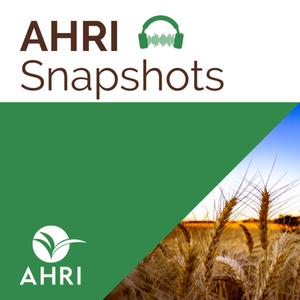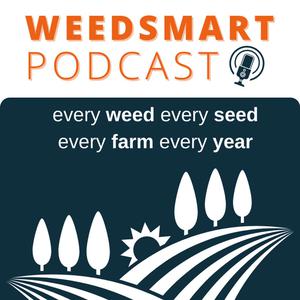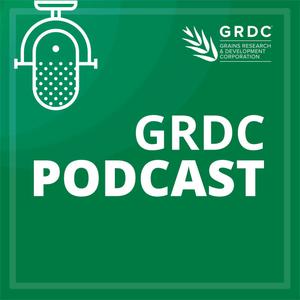
AHRI Snapshots
AHRI Snapshots
AHRI Snapshots is a podcast that provides information on what we do at the Australian Herbicide Resistance Initiative, as well as finding out what other researchers in weed science are up to around the country and the world. AHRI's researchers work out of the University of Western Australia, right next to the beautiful Swan River in WA's capital, Perth.
- 8 minutes 50 secondsDr Juan Vorster talks about herbicide resistance challenges in South Africa
In this episode of AHRI Snapshots, we catch up with an international guest. Dr Juan Vorster is an Associate Professor in Plant and Soil Sciences from the University of Pretoria, South Africa.
Juan is studying herbicide resistance mechanisms in weeds and the development of effective management strategies for these weeds.
He’s currently in Perth for a conference, so it’s a great opportunity to have a chat and learn more about his research.
To learn more about Juan's research, visit the University of Pretoria's website.You can follow AHRI on Twitter here. To learn more about AHRI's research and team, check out the website here.
6 November 2023, 7:00 pm - 7 minutes 52 secondsHot spot on goosegrass genome is a herbicide resistance generator
In this AHRI Snapshots, we catch up with Principal Research fellow, Dr Qin Yu about her latest paper on glyphosate resistance in goosegrass.
This paper was published in Nature Communications in August 2023, which is an impressive achievement.This paper is complicated, but essentially the researchers have found a hot spot on the genome of goosegrass that is a herbicide resistance generator.
In this research, the team found that in glyphosate-resistant goosegrass the EPSPS gene was translocated to the sub-telomer region and duplicated many times there, leading to glyphosate resistance occurring.
This work is useful not only in resistance gene discovery, but also in the development of gene-based next generation herbicides, like RNAi, as well as genetic reversal of resistance.
It will also contribute to studying the weediness and adaptation of this global weed species.
You can follow AHRI on Twitter here. To learn more about AHRI's research and team, check out the website here.
25 September 2023, 11:00 pm - 9 minutes 43 secondsHybrid versus open-pollinated canola
Over the last few years, the AHRI agronomy team has done extensive work looking at crop competition in hybrid and open-pollinated canola.
Project lead, Dr Mike Ashworth, joins us on this podcast to discuss the findings on ideal seeding rate, variety, row spacing and seed size.
Herbicides are currently working quite well in canola. We know that herbicide resistance is a real threat though, so we discuss what the current trends are in herbicide use in canola crops and what growers need to do to mitigate herbicide resistance.You can follow AHRI on Twitter here. To learn more about AHRI's research and team, check out the website here.
29 August 2023, 3:00 am - 21 minutes 6 secondsWhat do we do with weed genomes?
In this episode, we catch up with visiting Associate Professor Todd Gaines. Todd is from Colorado State University and is currently working from UWA with AHRI.
In September, he’ll be at the International Plant and Animal Genome Australia conference in Perth city, where he’s organising a two-hour session of invited talks.
Todd is also organising a subsequent workshop at UWA on September 22nd, which will have the theme “We have weed genomes, but what do we do now?”While herbicides are the most effective and widely adopted weed management practice, the evolution of multiple herbicide resistance in damaging weed species threatens the yield and profitability of many crops.
Todd is an expert in how genomics and molecular biology can contribute to improving weed management. He’ll explain what the focus will be at these upcoming events in this chat.
You can follow AHRI on Twitter here. To learn more about AHRI's research and team, check out the website here.
8 August 2023, 7:00 am - 15 minutes 25 secondsDeep learning can tell the difference between white and blue lupins
Blue lupins are notorious for being difficult to control and plants produce prolific seed banks.
Blue lupins are closely related to the domesticated narrow-leaf lupin, also known as the white lupin, so whichever herbicide is survived by white lupins is also survived by blue lupins. This is problematic as they look alike.This is where a team of researchers from AHRI and the Centre for Applied Bioinformatics at the University of Western Australia, led by UWA PhD candidate and Forrest Research Scholar, Monica Danilevicz comes in.
The team has recently taken the approach of using weed labelling and deep learning algorithms to see if they can distinguish between the two lupin species in images captured by unmanned aerial vehicles, known as UAVs, like drones, or ground-based cameras.The aim is to detect and spray just the blue lupins in crop. Monica explains the results further in this chat.
Links- Paper: Segmentation of Sandplain Lupin Weeds from Morphologically Similar Narrow-Leafed Lupins in the Field
- Code repository
- Image repository
- Centre for Applied Bioinformatics
- Follow Monica on Twitter here
- Github
- You can also read more about the research in the AHRI insight here
You can follow AHRI on Twitter here. To learn more about AHRI's research and team, check out the website here.
10 July 2023, 11:00 pm - 14 minutes 18 secondsTesting water quality for effective spray application
In this interview we chat with AHRI Research Officer Roberto Lujan Rocha about the survey work he has conducted on the quality of water sourced on farm for spray application.
This project is a collaboration between University of Western Australia, AHRI and the Centre for Water & Spatial Science.
The team looked at water from bores, dams, desalinated water, rainwater tanks and scheme water.Roberto surveyed water sources in the mid to south West Australian wheatbelt in September 2022 and has recently completed surveys of water sources in the Merredin area of Western Australia.
So why is this survey work important? Well, when it comes to optimising spray efficacy, water quality is an integral component.
Roberto’s initial survey showed that some water sources might fall outside the ideal ranges to ensure good spray application.
He explains the survey results in detail in this chat.
Links- Project factsheet
- GRDC spray water quality factsheet
- WeedSmart 'Optimise Spray Efficacy' Big 6 principle
You can follow AHRI on Twitter here. To learn more about AHRI's research and team, check out the website here.
12 June 2023, 6:00 am - 18 minutes 9 secondsHow scientists are studying summer weeds to predict and mitigate future resistance
As reliance on pre-emergent herbicides for both broadleaf and grass species is increasing, it’s essential to understand the dynamics of weed-herbicide interactions in the field.
Dr Mahima Krishnan and her colleagues from University of Adelaide are in the process of studying populations of summer weeds to help predict and then mitigate any future resistance that maybe develop by implementing appropriate herbicide application strategies. This is a project funded by GRDC and in collaboration with AHRI and University of Adelaide.
You can follow AHRI on Twitter here. To learn more about AHRI's research and team, check out the website here.
8 May 2023, 11:00 pm - 9 minutes 32 secondsCinmethylin couldn't be broken, but diversity is key to keeping it that way
On this episode of AHRI Snapshots, we’re catching up with former AHRI master’s student Geide Figueiredo (also known as JD) who worked alongside AHRI researcher Roberto Busi to try and break the herbicide cinmethylin, commercially known as Luximax.
Fortunately, they weren't able to break it, which is great news for farmers and agronomists because it means that this herbicide is still working and resistance hasn’t developed.
However, it’s always important to remember there’s no guarantee that resistance won’t develop, and the best way to prevent that is by using diverse weed control tactics.
You can read the AHRI insight and find the paper on this research here.You can follow AHRI on Twitter here. To learn more about AHRI's research and team, check out the website here.
10 April 2023, 11:00 pm - 14 minutes 23 secondsDr Aimone Porri talks on AHRI collaboration and his recent work on PPO mutations
In this interview, AHRI's Jessica Strauss chats with Dr Aimone Porri, who is the Laboratory Head for Herbicide Target and Weed Resistance Research at BASF, based in Germany. Aimone's work spans across several fields in the weeds resistance research space, including working as a Geneticist, Molecular Biologist, and Plant Biologist. At the time of this chat, he was in Australia visiting AHRI.
Aimone has collaborated with AHRI for several years. We talk about some of the significant work he has done, including , working on pyroxasulfone resistance in ryegrass, as well as work on cinmethylin and multiple herbicide resistant ryegrass.
We also chat about his current work in the weed resistance space, including his current paper on PPO mutations.
You can follow Aimone on Twitter here.You can follow AHRI on Twitter here. To learn more about AHRI's research and team, check out the website here.
14 March 2023, 1:00 am - 14 minutes 49 secondsThe benefits of 3D mapping soil moisture
In our first episode back for AHRI Snapshots this year, we chat with Dr Hira Shaukat, who previously was an AHRI PhD candidate.
Hira worked on 3D mapping of soil moisture throughout her PhD. Part of her work involved looking at how farmers could utilise degraded land affected by salinity. This involved figuring out what soil conditions would be suit the plant Leptospermum nitens. Nectar from this plant is a source of high-value medicinal honey production and can provide income from agriculturally marginal lands.
This is a deviation a bit away from the themes of weed control we usually cover in this podcast, however, looking at farming systems holistically is important. Land not suitable for crops can be a haven for weeds to proliferate, which in turn can end up in the crop. Planting a valuable species like Leptospermum nitens can provide an additional income source, and reduce the land availability for weeds to grow.
Hira chats to us about her findings, as well as the other applications 3D mapping can provide growers.You can follow AHRI on Twitter here. To learn more about AHRI's research and team, check out the website here.
14 February 2023, 7:00 am - 14 minutes 54 secondsProfessor Steve Duke talks on upcoming Herbicide Discovery and Development conference
This month on the podcast, we’re going to be finding out about the upcoming Herbicide Discovery and Development Conference, which is happening from January 18 to 20, 2023 at Curtin University.
Due to genetic resistance to many of the most used herbicides, the need for new ones is greater than ever.
This conference invites you to be part of the solution!
University of Mississippi Adjunct Research Professor, Steve Duke, will be the keynote speaker on Thursday January 19. He’ll be talking on “Molecular targets of herbicides and insecticides – are there overlaps that can be useful?” He joins us on this podcast to discuss what he'll be presenting on and gives an overview on what to expect from the conference.
You can get your tickets for the conference here.You can follow AHRI on Twitter here. To learn more about AHRI's research and team, check out the website here.
12 December 2022, 11:00 pm - More Episodes? Get the App
Your feedback is valuable to us. Should you encounter any bugs, glitches, lack of functionality or other problems, please email us on [email protected] or join Moon.FM Telegram Group where you can talk directly to the dev team who are happy to answer any queries.
 Dan Snow's History Hit
Dan Snow's History Hit
 The Howie Games
The Howie Games
 WeedSmart Podcast
WeedSmart Podcast
 GRDC Podcast
GRDC Podcast